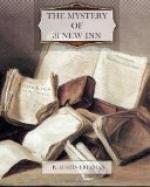“’I have viewed the body of the deceased and identify it as that of Mr. Jeffrey Blackmore. I knew the deceased well by sight and occasionally had a few words with him. I know nothing of his habits excepting that he used to sit up rather late. It is one of my duties to go round the Inn at night and call out the hours until one o’clock in the morning. When calling out “one o’clock” I often saw a light in the sitting-room of the deceased’s chambers. On the night of the fourteenth instant, the light was burning until past one o’clock, but it was in the bedroom. The light in the sitting-room was out by ten o’clock.’
“We now come to John Blackmore’s evidence. He says:
“’I have viewed the body of the deceased and recognize it as that of my brother Jeffrey. I last saw him alive on the twenty-third of February, when I called at his chambers. He then seemed in a very despondent state of mind and told me that his eyesight was fast failing. I was aware that he occasionally smoked opium, but I did not know that it was a confirmed habit. I urged him, on several occasions, to abandon the practice. I have no reason to believe that his affairs were in any way embarrassed or that he had any reason for making away with himself other than his failing eyesight; but, having regard to his state of mind when I last saw him, I am not surprised at what has happened.’
“That is the substance of John Blackmore’s evidence, and, as to Mr. Stephen, his statement merely sets forth the fact that he had identified the body as that of his uncle Jeffrey. And now I think you have all the facts. Is there anything more that you want to ask me before I go, for I must really run away now?”
“I should like,” said Thorndyke, “to know a little more about the parties concerned in this affair. But perhaps Mr. Stephen can give me the information.”
“I expect he can,” said Marchmont; “at any rate, he knows more about them than I do; so I will be off. If you should happen to think of any way,” he continued, with a sly smile, “of upsetting that will, just let me know, and I will lose no time in entering a caveat. Good-bye! Don’t trouble to let me out.”
As soon as he was gone, Thorndyke turned to Stephen Blackmore.
“I am going,” he said, “to ask you a few questions which may appear rather trifling, but you must remember that my methods of inquiry concern themselves with persons and things rather than with documents. For instance, I have not gathered very completely what sort of person your uncle Jeffrey was. Could you tell me a little more about him?”
“What shall I tell you?” Stephen asked with a slightly embarrassed air.
“Well, begin with his personal appearance.”
“That is rather difficult to describe,” said Stephen. “He was a medium-sized man and about five feet seven—fair, slightly grey, clean-shaved, rather spare and slight, had grey eyes, wore spectacles and stooped a little as he walked. He was quiet and gentle in manner, rather yielding and irresolute in character, and his health was not at all robust though he had no infirmity or disease excepting his bad eyesight. His age was about fifty-five.”




